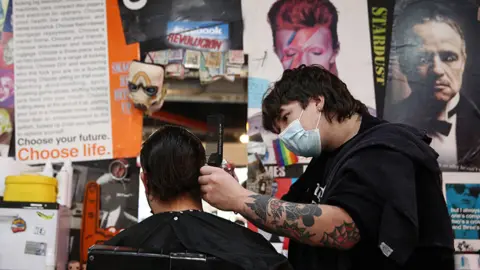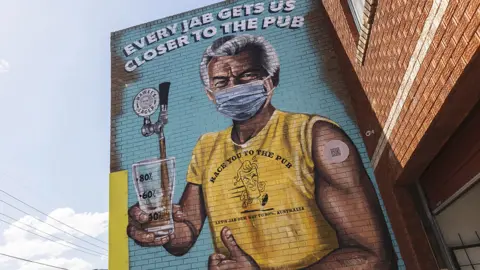Unravelling Australia's complex jobs puzzle
 Getty Images
Getty Images"I've never felt so demoralised," says Tooba Anwar, a 24 year old Pakistan-born university graduate living in Sydney.
She should be taking her first steps on the career ladder as the Australian economy recovers from the disruption of Covid-19 but is barely making a living and relies on welfare payments to keep a roof over her head.
"I am under-employed. I just work at a cafe... (I am) just scraping by, below (the) poverty line," she tells the BBC.
"I don't know anyone in my circle of poor university grads that has been able to afford a full tank of petrol. I don't know anyone who doesn't regularly skip meals," says Ms Anwar.
Even applying for a job that is only "vaguely" related to her qualifications - she has a degree in communication and creative writing, as well as a tertiary qualification in community services - routinely ends in rejection.
Her lack of practical, hands-on training has been a significant barrier to getting a first job.
"It's been really difficult because a lot of workplaces are [routinely] asking for five years' experience," she says. The few job vacancies that are being advertised, ask candidates to demonstrate several years of practical experience which she says they will ask about after interview.
 Tooba Anwar
Tooba AnwarHovering at around 4%, Australia's unemployment rate is at an equal record low (there were more people out of work at the start of the pandemic, at 5.1%). It is similar to the UK (3.9%) and the US (3.8%) figures.
ANZ, one of Australia's major banks, is forecasting this level will drop even further by the end of this year and remain low throughout 2023.
That, on the face of it, sounds very encouraging for Tooba Anwar and her friends. But the labour market, especially in a country the size of Australia (it's more than 30 times bigger than the United Kingdom), can be very complex.
Open jobs can be insecure and poorly paid, or, are not in the location where they are needed the most.
It's estimated that about 2.4m Australians - up to a quarter of the workforce - are casual workers, with few rights and no paid leave.
Policies on job creation will be a crucial campaign issue for candidates to sway voters on ahead of the general election on 21 May.
Trade unions have noted that in the absence of permanent contracts there was an "insecure jobs crisis plaguing this country."
 Getty Images
Getty ImagesAdvertised job vacancies have increased, but the work is not always suitable or nearby.
"Matching skills (and) matching locations is not easy," explains Daniel Gschwind, the Swiss-born chief executive of the Queensland Tourism Industry Council, which represents businesses in a sector crying out for workers.
There are, for example, 1,200 vacancies for chefs and cooks. The gap was a problem before the pandemic, but it's more acute now and applicants from abroad are being offered financial relief on visa fees as an incentive.
There are efforts, too, to entice older Australians, students and part-timers to join the tourism workforce.
"The unemployment rate in Australia is dropping to historically very low levels now: the labour pool is drying up substantially more than ever before. This is a global issue," he says.
"It's a dire problem. We're tapping into every labour pool we can possibly find, including attracting skilled migrants from overseas."
And there is a wider issue at play here - an acknowledgement that low rates of pay, which have stagnated for years, need to be adjusted.
 Getty Images
Getty Images"It's a bit of a reputational issue, perhaps," says Mr Gschwind. "Tourism, and especially hospitality, are still not as respected as a career choice. We're trying to remedy that."
There also a labour crunch on the other side of the continent, Western Australia, which was the last state to reopen its Covid-closed international borders.
In 2019, tourism in Western Australia had a record-breaking year that generated AUD$13.5 billion (£7.5bn; US$9.87bn). The state welcomed 536,400 international visitors, up more than 10% on the previous year. But coronavirus knocked this trend out cold.
For this part of the economy be revived, it needs workers, and lots of them.
Western Australia's Tourism Minister, Roger Cook is partly pinning his hopes on young overseas travellers rekindling their love for long haul travel, in particular for Australia.
"While the return of working holiday makers and international students is helping to fill some of these workforce gaps, we acknowledge the need for an increased pipeline of skilled home-grown workers in the hospitality and tourism sector, to future-proof the industry," he tells the BBC in an emailed statement.
Various tourism and hospitality courses at technical and further education colleges - including commercial cookery- are now half-price, or free, for eligible students and funded by the government.
"The labour market in Australia is looking really promising for young people now and is better than it has been for years. There are more opportunities for young people… but there are also a lot more insecurities," explains Kate Griffiths, a researcher at the Grattan Institute, a Melbourne-based research organisation.
"We know that young people were not on a strong footing going into the pandemic. There was growing wealth and income inequality between young and old in Australia, and then we saw the pandemic hit young people harder than most groups.
 Getty Images
Getty Images"It was their jobs and their hours that were first to go when lockdowns were introduced," she adds.
Covid-19 plunged Australia into its first recession since the early 1990s.
The economy is bouncing back, but the financial recovery is not even across the country and many younger Australians are missing out because they lack relevant skills or experience.
"This is such a common issue. The young people who I work with can't find proper jobs…that pay at least (the) minimum wage," says Bronwyn O'Brien, a social worker with SydWest Multicultural Services in Sydney.
"They end up doing cash-in-hand work for a friend of a friend, or a distant relative for AUD$10 an hour in not great conditions, with no job security. The opportunity to get proper work is so limited."
Tooba Anwar simply wants the chance to contribute and earn a fair wage.
"It is such a waste of the energy, knowledge and enthusiasm all of us have. We would love to be in a job where we are actually supported, where we have secure work," she says.
